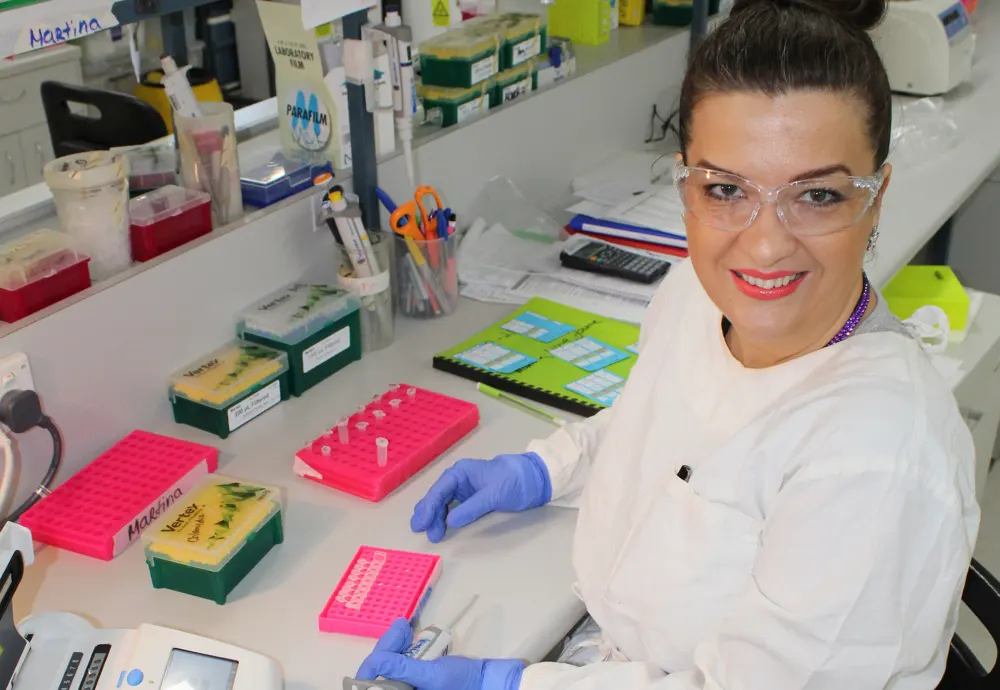Blog
Contact media@wires.org.au for enquiries or call 0416 272 153.
For the latest updates on bushfire recovery projects and emergency response
Read WIRES Emergency Recovery Plan and WIRES National Emergency Response Plan
Research Grants Program-2023 Recipients Announced

1: Dr Martina Jelocnik, Lead Chief Investigator for the University of the Sunshine Coast project
WIRES is delighted to announce the successful grant recipients for the WIRES Research Grants Program 2023. These nine projects represent a diverse range of initiatives aimed at understanding and protecting Australia's unique wildlife.
Eligible applicants are invited to submit proposals that adhere to one or more of the following categories:
- Category 1: Risk-Reduction
Research that will help reduce the likelihood of wildlife requiring rescue and rehabilitation. - Category 2: Rescue and Rehabilitation
Rehabilitation research that will improve rescue and rehabilitation methods. - Category 3: Release
Research that improves post-release outcomes for rehabilitated wildlife. - Category 4: Recovery
Research that aids the recovery of wild populations and their habitats.
Since the first year of WIRES Research Grants Program in 2021, successful projects have included habitat restoration for threatened bats, post-bushfire provisioning for wildlife, disease research in koalas and reptiles and much more.
Approved projects for Research Grants Program 2023 cover a wide range of research topics, including marine debris, co-infections in koalas, pathogen surveillance for marine birds, artificial refuges for fauna, heavy metal exposure in platypus populations, threats to greater gliders, the marsupial gut microbiome, possum rehabilitation, and improving the care of injured turtles.
Introducing research projects for 2023 across Australia
Research Institution |
Application |
Monash University |
Disentangling the long-term effects of marine debris on Australian fur seals |
University of the Sunshine Coast |
Understanding the prevalence and impact of other bacterial, viral and chlamydial co-infections in koalas |
University of Tasmania |
Vectors and victims: East Australian Pathogen Surveillance for Australia's Threatened Marine Birds (EA-PATH) |
Charles Sturt University |
Deploying artificial refuges for threatened fauna in fire-prone landscapes |
Western Sydney University |
Quantifying heavy metal and anthropogenic contaminant exposure in platypus (Ornithorhynchus anatinus) populations in a World Heritage Area |
University of Wollongong |
Parasites, pathogens and population health: investigating threats to the endangered greater glider in NSW |
La Trobe University |
The marsupial gut microbiome: improving rearing and release outcomes by supporting the development of host-associated gut microbial diversity |
University of Sydney |
Possum on a hot-tin roof! Assessing treatment and release outcomes for critically endangered possums burned during extreme heat events in Western Australia |
Western Sydney University |
Strengthening Wildlife Rehabilitation: Advancing Scientific Literacy and Best Practices for the Care and Management of Injured Turtles by Wildlife Carers |
We extend our sincere congratulations to all the grant recipients and commend their commitment to wildlife conservation. WIRES is excited to support these projects and eagerly anticipates the valuable insights and outcomes they will bring.
To learn more about the WIRES Research Grants Program 2023 and the individual projects, please visit our website at wires.org.au/research-grants-program.
Search
Newsletter
Stay in touch and get our regular rescue stories, WIRES updates and a free copy of our 15 Ways to Help Wildlife ebook
Recent Posts
- Emergency Response Training for Wildlife Volunteers
- WIRES Introduces New Wildlife Rehabilitation Governance Courses in Collaboration with NPWS
- Community Support for Post-Bushfire Recovery of Wildlife in the Greater Blue Mountains
- Research Grants Program-2023 Recipients Announced
- National Koala Conference
- Nature Conservation Council's Bushfire Conference
- Support Stronger Nature Laws
- Helping Endangered Cockatoos: WIRES Grant Success Story
- Landmark Conservation Project Ensures The Future of The Northern Bettong
- Wildlife Road Collisions Unveiled
